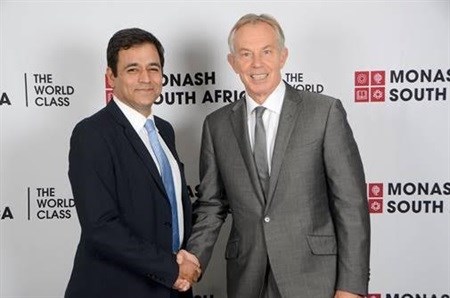Reigniting Africa

Blair addressed VIPs, the media and delegates at Monash South Africa in Gauteng on the topic of internationalisation and Africa.
“We are seeing a new generation of leaders emerge and countries are taking their destiny into their own hands. People are not looking at outside reasons why their country is not functioning well, and there is a desire and determination to make it work. This is different to before. While there are still great challenges in government, there are ways to overcome this, and that is why I am optimistic about Africa,” he states.
However, vital to this is the business environment. “Getting business to invest in a country is not complicated; it requires a business environment that is not bogged down in corruption or bureaucracy. Vital and allied to this is the rule of law.”
While he says that he cannot think of a single first world country that is successful where these elements are not present, he admits that “reform in any institution is difficult”.
That said, there are smart people here, so Africa needs to make it work. “It is about the institutions and an attitude of mind. Internationalisation is about looking at what is out there, choosing the best option and bringing it back.”
If your government is operating properly, a country can achieve anything. “It is about doing the right thing or not. How Africa internationalises is up to it. But, there are many lessons the countries on this continent can learn from.”
In 1960 the West African country Sierra Leone and South Korea in Asia were both third world countries. Today one is still a third world country, while the other, South Korea, is a first world country. Why? “Because South Korea put in place institutions that are resilient and not corrupt, and accepted the role of the market and the state. It successfully worked to escape old-fashioned idioms, looked at lessons from across the world, and then implemented them.”
On the continent Rwanda is an example of a country that has benefited from lessons across the world, in particular the reform of its education system. “Singapore is another good example of a country that deliberately went a particular route, and as a result as has gone from inviting intellectual capital into its country to exporting it today.”
He believes globalisation is a good thing, and is the opening up of the world. London, he says, is a great city because of its diversity. “Anti-globalisation protests represent different things for different people, so anti-globalisation right wing protests are against immigrants, but the same protests, but for the left wing, are based on the concept that international capital is bad. But you cannot stop immigration any more than you can stop capital moving around the world. It is futile to resist globalisation, so what we need to do is better prepare people for it.”
When you look at Africa as a contributor to globalisation and the global economy, you have to first look at intra-African trade. Currently this sits at only 12%. “Therefore, Africa has to make this a priority and break down the barriers between the continent’s different countries.”












